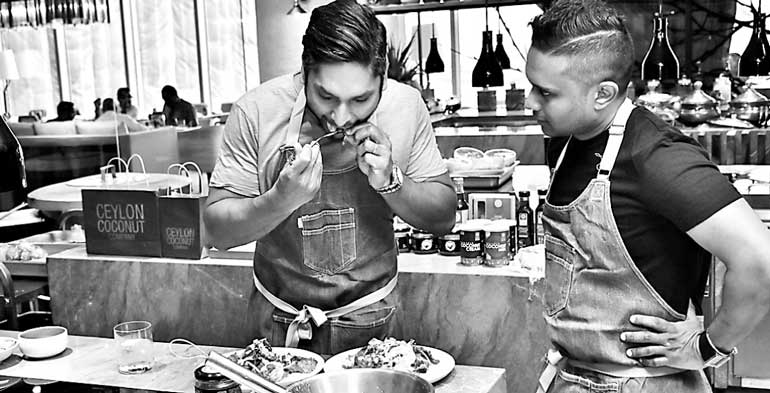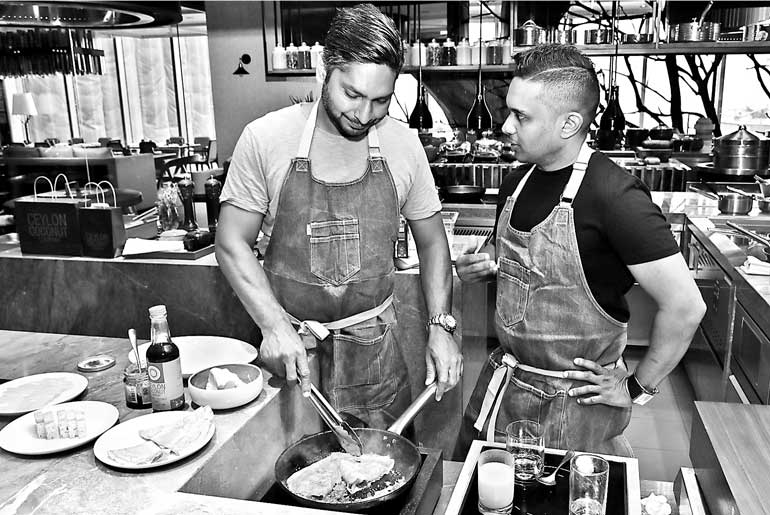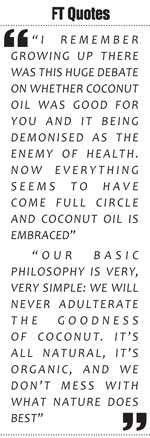Friday Feb 13, 2026
Friday Feb 13, 2026
Saturday, 10 February 2018 00:00 - - {{hitsCtrl.values.hits}}


By Madushka Balasuriya
Kumar Sangakkara is back. But no, it’s not what you think. At the ripe old age of 40, father, husband, and retired cricketing great, ‘Sanga’ – as he is fondly known to the masses – is on a new adventure, one that started in 2014 with the formation of the Ceylon Coconut Company.
“We started with three likeminded partners. We had all grown up ingesting coconut in some way or the other. For me it was my father insisting that for every breakfast there should be pol sambol,” says Kumar.
 “And from there onwards, I remember growing up there was this huge debate on whether coconut oil was good for you and it being demonised as the enemy of health. Now everything seems to have come full circle and coconut oil is embraced – virgin coconut oil especially – as a very healthy product. And that coconut itself, in its various forms and used properly, has a huge amount of health benefits.”
“And from there onwards, I remember growing up there was this huge debate on whether coconut oil was good for you and it being demonised as the enemy of health. Now everything seems to have come full circle and coconut oil is embraced – virgin coconut oil especially – as a very healthy product. And that coconut itself, in its various forms and used properly, has a huge amount of health benefits.”
He’s talking to me as he sits in a makeup chair, taking a break from a midweek photoshoot for one of his many brand ambassador engagements. As a cricket fan, as well as someone who writes regularly about cricket, this is not the setting I had imagined my first interview with one of my sporting idols taking place. Nor would I have guessed the subject matter.
In just a few hours Kumar is going to be participating in his first-ever cooking show, alongside US-based Sri Lankan celebrity chef Charles Disa. The video, which is being shot at the Shangri-La Colombo kitchens, aims to highlight some “delicious and easy” ways to use Ceylon Coconut products in the kitchen.
“I do cook a bit, but I don’t cook very well. Well sometimes I do, but I can’t cook rice and curry. I love cooking though and it’s something that I really try to do more of now that I’ve retired. I’m trying to get better at it, and hopefully the tips from Chef Charles will be great.
“I’m also a bit nervous. I’ve never been on a cookery program before. To really sit with him and understand how I can use the same coconut products that Ceylon Coconut produces in cooking, in new ways of cooking, and actually taste the food and see how it works and what it adds to the food, that’ll be an experience for me as well.”
Apart from Kumar, The Ceylon Coconut Company has three other founding members: Gehan De Alwis, Avanthie De Zoysa, and Chamila Wickramasinghe. The company produces a range of coconut-based products, from familiar items such as Coconut Milk and Virgin Coconut Oil to newer ones like Coconut Chips, Organic Coconut Honey, and Organic Coconut Sugar.
Chef Charles meanwhile is responsible for the company’s most unique range, their signature blends. The award-winning chef has cited this handcrafted range of oils, infused with premium Sri Lankan herbs and spices, as the secret ingredient that makes his dishes pop.
“I first met Chef Charles thanks to Chamila, one of our directors. How he’s used his own Sri Lankan product and Sri Lankan heritage to enhance his culinary skills and flavour in his cooking is wonderful to know. It goes to show that what a lot of Sri Lankan chefs are doing around the world, is taking that unique Sri Lankan imprint and adding and melding with the other experiences they’ve had, and Chef Charles has been wonderful in that way.
“He’s also exactly the kind of person that’s been very good to our product image by adding a lot of knowledge, and actually having executed it practically – he’s tried and tested it so he knows it works – so it’s not an experimental product as such.”
Quality assurance
 Indeed for the Ceylon Coconut Company, quality assurance is at the top of its list of priorities, with Kumar regularly at pains to stress their desire to only promote and sell a product that they themselves have complete trust in.
Indeed for the Ceylon Coconut Company, quality assurance is at the top of its list of priorities, with Kumar regularly at pains to stress their desire to only promote and sell a product that they themselves have complete trust in.
“Our basic philosophy is very, very simple: we will never adulterate the goodness of coconut. It’s all natural, it’s organic, and we don’t mess with what nature does best. Anyone who tries the product understands the quality. Demand has been growing, but one of the challenges we’ve had is to up our production and ensure that we’re able to meet that demand while retaining quality.”
“It’s easy to take short cuts if you want to, but that’s not what we want to do. We want to create a product that is of supreme quality, that is all natural, organic and something that we can offer with complete faith and trust to the customer. Whatever we add to it is all natural, but it will not take away from essence of the product.”
The company initially kept its focus solely on traditional coconut based products such as organic virgin coconut oil, coconut flour, and coconut butter. However as of last year and 2018, they are branching out. Alongside the collaboration with Chef Charles, the Ceylon Coconut Company is also moving into more value-added products, Coconut Aminos Seasoning Sauce, Coconut Yoghurt, Pani Pol and Boozy Pani Pol to name a few.
The move is seen as a way for the company to increase its exposure in international markets, an area in which Sri Lanka is still a minor player. As of 2017 Sri Lanka was the fifth largest producer of coconut globally, however that only translated to 4% of the global market, with some 80% of Sri Lanka’s coconut production consumed domestically. As a reference point, Indonesia (30%), Philippines (25%), and India (20%) account for 75% of global market share.
Branding is key
However, Kumar is undeterred. With brand development at the forefront of the company’s objectives, he and his partners envision a future where Ceylon Coconut is viewed in the same vein as Ceylon Tea or Ceylon Cinnamon.
“Ceylon Tea is synonymous with that whole quality, the mystic, the benefits. It’s the same with Ceylon Coconut. Why choose a Ceylon Coconut product? Because our coconuts are naturally – by growing on this soil, in this country, this geographical position – far more nutritious, have more health benefits, adds more value. So why not?
“Has it ever come with an explanation? You get a bottle of coconut oil and there’s nothing about what this is. The history of the Ceylon coconut is not known in Sri Lanka, but 3000 years ago the Greeks were writing about the coconuts in Ceylon. There are documents older than the Mahavamsa that have documented benefits of the Ceylon coconut! So this is not something new, it’s just something that we’ve forgotten.”
Those involved with the Ceylon Coconut Company however are not oblivious as to why coconut oil was placed on the back burner, so to speak, for so many years – namely its unique taste.
“I personally love the taste of coconut oil. If you’ve ever eaten a fried egg in coconut oil, it’s magnificent. But some people don’t, and you have to understand the different palates, different taste buds, different sensitivities. And so there are ways you can take the taste of coconut out of the coconut oil but leave the goodness in it.
“That’s the technical side but I’m not an expert on what can be done. And it does nothing to lower the quality of the product. It actually makes the goodness of coconut available to a lot of people who might not have a taste for the distinctive coconut flavour. So that’s something that’s being looked at as well.”
You can catch Kumar and Chef Charles whipping up a coconut-infused storm this Friday, when the video is expected to be posted online.
Pix by Indraratne Balasuriya
